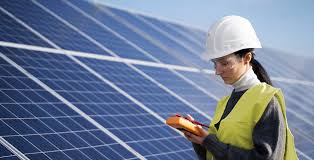The switch to green energy in Europe is caught in a difficult situation. Record solar energy installations are being driven by a rush of low-cost Chinese solar panel imports. But those same imports are killing Europe’s few homegrown solar firms.
Opinions on how to react are divided among governments and businesses.
Green energy had a huge year in Europe recently. Record amounts of solar capacity were deployed by EU countries, 40% more than in 2022. According to figures from the International Energy Agency, China supplied 95% or more of those panels and parts.
However, the surge in green energy hasn’t helped Europe’s small domestic solar panel makers, who are facing financial ruin due to overstocking and lower-priced imports. The industry has warned that unless governments intervene, half of its capacity may shut down in a matter of weeks, and announcements of plant closures are mounting.
Laptops 1000Though they disagree on how to respond, policymakers are rushing to act.
Germany’s Economy Minister Robert Habeck expressed concern to the European Commission in November that trade curbs on Chinese solar imports will soon be imposed by the EU executive.
“I’ve heard that the Commission may plan to apply protective measures to prevent the importation of Chinese solar modules. I’m concerned about this,” the letter stated.
Habeck cautioned that limiting Chinese imports may halt Europe’s swift progress in renewable energy and increase the cost of 90% of the photovoltaic market. According to him, it put EU businesses that install and assemble solar panels using foreign parts in danger of going bankrupt.
Germany’s economy ministry declined to comment on the letter through a spokesman.
Germany’s government budget problem has caused havoc with the country’s intended support for the sector.
Levies on imports of solar panel components have not been ruled out by Spain. According to a government official, the Netherlands wants to apply the EU’s carbon border fee to solar PV imports. And last week, Italy declared that it will invest 90 million euros, or $97 million, in a solar panel facility located in Sicily.
A PRICE WAR
EU Financial Services Commissioner Mairead McGuinness provided no fresh backing in a speech on Monday regarding the issues facing the solar sector. She cited existing EU initiatives, such as a regulation that is scheduled for finalization on Tuesday, to expedite permissions for local production and provide EU-made goods—like panels—with a competitive edge in upcoming clean technology bids.
Regarding trade restrictions, McGuinness expressed caution.
“Given that we currently rely to a very important degree on imports to reach EU solar deployment targets, any potential measure needs to be weighed against the objectives we have set ourselves when it comes to the energy transition,” she stated.
Laptops 1000The industry is split on the solution. Government intervention to purchase excess solar module inventory has been called for by solar manufacturers. If quick action is not possible, trade obstacles may be taken into consideration.
However, the green energy sector as a whole is against import restrictions.
According to Miguel Stilwell d’Andrade, CEO of Portuguese utility EDP, “You can’t reduce dependency on China in the short term or you don’t build the projects.”.
He pointed out that because of tariffs on Chinese imports; the cost of solar panels has increased in the US. “It is having an inflationary impact … the price of panels is more than double that of Europe,” he stated.
Even local manufacturers have bleak expectations for a competitive local market.
According to Gunter Erfurt, CEO of Swiss panel manufacturer Meyer Burger, which intends to close its loss-making German solar module facility and blames the lack of supportive European legislation for the move, Europe is engaged in a “price war” with China.
Europe is lagging as some Chinese solar companies can sell for even less than their production expenses. “The solar industry in China has been strategically subsidized with hundreds of billions of dollars for years,” Erfurt stated.

















